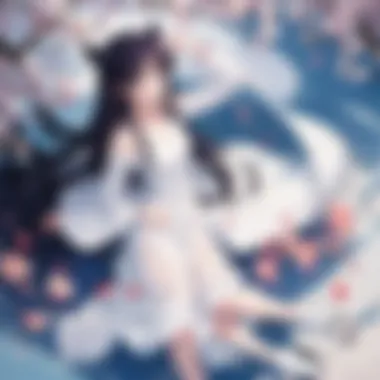An In-Depth Examination of Fruits Basket: The Anime


Intro
In the realm of anime, few series have managed to weave rich narratives with deep character development, as effectively as Fruits Basket. This series, originally a manga by Natsuki Takaya, was adapted into anime form twice: first in 2001 and then in 2019. Each version brought its unique flair and interpretations of the story and characters. Through the lens of Fruits Basket, we observe the intricacies of human emotions, relationships, and the weight of societal expectations.
The series revolves around Tohru Honda, an orphaned high school girl, who inadvertently becomes embroiled in the lives of the enigmatic Sohma family. The family's curse—which transforms them into animals of the Chinese Zodiac—serves as a compelling metaphor for their struggles. As we explore the character arcs, thematic elements, and cultural context, the impact of Fruits Basket becomes undeniably apparent.
Not only does it engage with ideas of identity and acceptance, but it also mirrors broader societal issues that resonate with audiences of various backgrounds. The aim here is to dissect these thoughtful layers, enriching the viewer's appreciation and understanding of this significant work in the anime landscape.
Character Analysis
Overview of Character Development
In Fruits Basket, character development is executed with a finesse that is both intricate and relatable. Tohru Honda, the protagonist, evolves from a naive girl into a source of strength for the Sohma family. Her interactions expose the vulnerabilities of others, revealing how trauma can shape individuals. A notable point in her journey is her growing realization of the importance of both accepting help and providing it.
The members of the Sohma family each showcase a distinct relationship with their curse. Characters like Yuki and Kyo exemplify the battle against their self-imposed limitations. Yuki struggles with his identity and insecurity, while Kyo grapples with his anger and feelings of inadequacy. Their arcs highlight not only personal growth but the importance of solidarity in overcoming adversity.
Key Relationships and Dynamics
The relationships within Fruits Basket are a tapestry of complexity and emotion. Tohru’s interactions with Yuki and Kyo serve to illuminate their individual battles. Yuki’s admiration for Tohru develops into a close friendship, fostering his gradual acceptance of himself and others. On the other hand, Kyo’s fiery demeanor hides a deep insecurities. His growth hinges on Tohru's gentle encouragement.
"Friendship can illuminate the darkest paths."
This statement holds true within the context of Fruits Basket. The bond shared by the characters emphasizes how connections can lead to healing and self-discovery, underlying one of the core messages of the series.
Thematic Exploration
Central Themes and Messages
Fruits Basket is notable for its exploration of profound themes such as trauma, familial love, and acceptance. The curse experienced by the Sohma family serves as a stand-in for personal struggles that are often invisible but deeply felt. The narrative invites viewers to reflect on their own inner battles and how these affect their relationships.
The series also tackles the theme of redemption. Characters like Akito Sohma, who initially embodies toxicity and traditionalism, undergo significant transformations. This highlights the potential for change and the possibility of breaking generational cycles.
Cultural Context and Influences
The success of Fruits Basket can be attributed to its reflection of societal norms and challenges. Themes of social stratification and familial obligation resonate in many cultures, particularly in Japan where hierarchy and family ties are often emphasized. By situating its narrative within this cultural framework, Fruits Basket engages viewers in a dialogue about individualism versus collectivism.
The nuanced portrayal of characters dealing with personal struggles against overarching societal pressures resonates with audiences. It encourages reflection on the ways in which cultural contexts shape individual experience.
Through this examination, it becomes clear that Fruits Basket is not merely a tale about curses and love. It is a narrative rich in emotional depth, offering insights that are relevant far beyond the confines of its story. With thoughtful character development and compelling themes, this series invites viewers to engage in self-reflection and empathy.
Prelims to Fruits Basket
Fruits Basket stands as a significant work in the realm of anime, known for its profound impact on viewers and its intricate storytelling. This section serves to introduce the core elements that make Fruits Basket an essential series for both newcomers and seasoned fans.
The anime is not merely about its surface story; it explores complex themes such as love, acceptance, and the challenges of family ties. Delving into these themes allows the audience to connect on a deeper level, enhancing their viewing experience. In this article, the exploration of Fruits Basket will illuminate its narrative structure, character development, and how it reflects societal issues. This comprehensive guide will serve as an analytical lens through which to understand the significance of the series beyond its entertainment value.
Origins and Creation
Fruits Basket originated as a manga series written by Natsuki Takaya, first serialized in 1998. The show captured attention due to its blend of everyday life and supernatural elements. Takaya's heartfelt storytelling resonated with readers, leading to its adaptation into an anime series that premiered in 2001. This early adaptation was met with a mixed response, primarily due to a rushed plot and unresolved storylines.
In 2019, a reboot was launched, aiming to stay faithful to Takaya's original work. The new adaptation provides a more thorough portrayal of character arcs and thematic depth. The significance of this reboot not only revitalized the franchise but also introduced the story to a new generation, allowing for a fresh appreciation of the narrative.
Synopsis of the Plot


The plot of Fruits Basket centers around Tohru Honda, a high school girl who becomes entangled in the lives of the Sohma family. Tohru's encounter with the Sohma family reveals their unique curse: members transform into animals of the Chinese zodiac when hugged by someone of the opposite sex. This premise sets the stage for a blend of comedy and drama, encompassing Tohru's struggle to navigate her own family background while helping the Sohmas confront their intertwined relationships.
Throughout the series, themes of vulnerability and healing emerge as Tohru’s optimism gradually influences the members of the Sohma family. The viewers are taken on a journey that highlights Tohru's resilience and the complexities of familial bonds. The narrative is rich with emotional depth, exploring not only Tohru's perspective but also the myriad of struggles faced by the Sohma family.
Understanding the Characters
Fruits Basket thrives on its rich tapestry of characters, each woven into the overall narrative with precision. Understanding these characters is vital, as they exemplify the themes of love, acceptance, and the complexities of human nature. The interactions between the characters provide insight into their development and the story itself, creating layers that captivate audiences. By focusing on character arcs, viewers can appreciate how personal struggles echo wider societal issues, making the series relatable.
Main Protagonist: Tohru Honda
Tohru Honda, the series' central character, embodies kindness and resilience. Her optimistic outlook serves as a balancing force amidst the turmoil of the Sohma family. Tohru's journey is significant as it showcases her growth from an orphan living in a tent to finding a loving home. Her genuine compassion helps unlock the buried emotions of those around her. It is her naivety that often contrasts with the darker secrets of the Sohma family, creating a poignant dynamic that enriches the plot.
The Sohma Family Dynamics
The Sohma family presents a complex interaction of personalities and hidden truths that drive much of the narrative.
Yuki Sohma
Yuki Sohma, often referred to as the "prince" of the school, copes with immense pressure stemming from family expectations. His character offers insight into the psychological burdens of being seen as perfect. Yuki's struggle with self-identity and the need for acceptance resonate with many viewers. His development from a shy boy to someone who learns to embrace his true self illustrates a powerful theme of self-acceptance. Despite his popularity, Yuki's journey is not without its disadvantages: the isolation and fear he faces are relatable hardships that deepen his character.
Kyo Sohma
Kyo Sohma's fierce personality and temper represent the struggle against societal labels. Cursed to turn into a cat, Kyo embodies the fight for acceptance, reflecting ideas of self-worth and redemption. His intense rivalry with Yuki captures themes of jealousy and personal growth. Kyo's character arc shows his shift from frustration and self-loathing to embracing his flaws, which adds a layer of complexity to the narrative. The focus on Kyo's emotional journey offers a contrasting perspective to Yuki, providing viewers with diverse emotional experiences.
Shigure Sohma
Shigure Sohma, as the older and more enigmatic member of the family, provides a unique lens into family dynamics. His playful yet manipulative nature often leaves viewers questioning his true intentions. Shigure's character develops the theme of maturity in the face of pain, showcasing how humor can mask deeper scars. While he serves as a comic relief, his underlying motivations can complicate relationships within the family. The duality of Shigure's character captivates the audience as they navigate his surface-level joy alongside the sadness of his reality.
Supporting Characters and Their Roles
The supporting characters in Fruits Basket further enrich the story, each adding their unique perspectives and challenges.
Momiji Sohma
Momiji Sohma stands out due to his youthful exuberance that contrasts with the series' darker themes. His cheerful disposition often brings light to heavy moments, showcasing unyielding hope. Understanding Momiji's character helps reflect on the impact of familial expectations, as he hides his own pain beneath a mask of joy. This depth makes him an important symbol of how appearances can be deceiving, providing significant insight into the struggles of unaccepted family members.
Hatori Sohma
Hatori Sohma, the family doctor, embodies themes of sacrifice and duty. His character represents the weight of responsibilities that come with family secrets. Hatori's past love story, shadowed by loss, provides a nuanced understanding of the costs of caring for others. By analyzing his character, we see the intersection of personal desires and familial loyalty, revealing heartbreaking truths that resonate with many.
Akito Sohma
Akito Sohma serves as a pivotal figure whose complexities drive much of the emotional tension within the series. Representing the manipulative force of the family, Akito's character highlights themes of power and control within familial structures. Their tumultuous relationship with other Sohmas reveals vulnerabilities and the cycle of abuse that can permeate families. Akito's journey, marked by loneliness and vulnerability, evokes a sense of empathy despite their overwhelming presence within the story. The unraveling of Akito's character reflects broader themes of isolation and consequences of inherited trauma.
Thematic Elements in Fruits Basket
Understanding the thematic elements in Fruits Basket is key to grasping its enduring appeal. The series is marked with profound narratives that resonate with viewers. These themes not only enhance the character arcs but also reflect various aspects of human experience. Each theme works symbiotically to form a rich tapestry of emotion and connection.
Exploration of Love and Affection
Love and affection are central themes in the narrative of Fruits Basket. The connections between characters showcase different types of love, such as familial love, friendship, and romantic relationships. Tohru Honda's unconditional love for the Sohma family plays a pivotal role. Her kindness and acceptance provide a contrast to the ailing relationships within the Sohma family.
Moreover, romantic entanglements, particularly between Tohru, Yuki, and Kyo, reveal the complexities of love. Kyo's journey illustrates how love requires vulnerability, while Yuki represents a more reserved but equally intense approach to affection. The love depicted is multifaceted, showing its ability to heal wounds or cause conflict.


Themes of Acceptance and Belonging
Fruits Basket delves deeply into themes of acceptance and belonging. Many characters struggle with their identity and place in the world. The Sohma family's curse serves as a metaphor for emotional burdens and societal expectations. Each member grapples with their inherited traits and the stigma that comes with them.
Tohru embodies the spirit of acceptance. Her interactions promote a sense of belonging among the characters, who often feel isolated due to their secrets. The series suggests that acceptance is essential, not just from others but also from oneself.
Acceptance ultimately fosters community. Tohru's influence leads the Sohmas on a path towards mutual understanding and healing, making the themes of acceptance and belonging integral to the overall narrative.
The Burden of Family Secrets
The weight of family secrets is a significant theme in Fruits Basket. The Sohma family is burdened with hidden truths that shape their realities. The family's curse remains a secret, influencing how the characters relate to one another and impacting their mental health.
The secrecy creates distance. Characters like Akito Sohma embody the consequences of suppressed emotions and isolation. As the story progresses, the exposure of these secrets leads to pivotal moments of change. Characters confront their pasts, highlighting a cycle of hurt and healing.
The narrative stresses that revealing these secrets can lead to liberation. This theme is crucial as it demonstrates that confronting one's history, however painful, is necessary for growth. It encourages viewers to acknowledge and address their own hidden truths.
"The true essence of Fruits Basket lies in its ability to portray human emotions through the lens of extraordinary circumstances."
Through these thematic elements, Fruits Basket offers a nuanced exploration of love, acceptance, and the burdens we carry, all while crafting a compelling story that engages viewers on multiple levels. Whether one relates to the struggles of finding acceptance or the challenges posed by family secrets, these themes resonate deeply, ensuring the anime's place in the landscape of influential storytelling.
Adaptations of Fruits Basket
The various adaptations of Fruits Basket hold significant importance in understanding the evolution and depth of the narrative. Each adaptation, whether the original anime series or the 2019 reboot, reflects different interpretations of the story, character dynamics, and thematic elements. This section will analyze these adaptations to explore how they contribute to the overall impact of the series. The comparisons will shed light on the strengths and weaknesses of each version, highlighting what they bring to anime culture.
The Original Anime Series
The original Fruits Basket anime aired in 2001 and was pivotal in introducing many viewers to the world of shoujo anime. It consisted of 26 episodes, focusing primarily on the beginning arcs of the manga. While it captured the essence of the characters, it diverged significantly from its source material, leaving many subplots underexplored.
Some elements, like the essence of Tohru's kindness and the Sohma family's struggles, were successfully conveyed. The original series brought a sense of warmth and humor. However, it faced criticism for its abrupt ending, which left fans wanting more. The pacing felt rushed, and key themes from the manga were not fully developed. Nonetheless, it was a vital stepping stone for the series, allowing for a dedicated fanbase to emerge.
The Reboot
In 2019, Fruits Basket was rebooted with a fresh take, aiming to stay true to Natsuki Takaya's original manga. The new adaptation consisted of three seasons, totaling 63 episodes, which enabled a comprehensive exploration of the story. Here, two critical aspects stand out—art style and animation techniques, as well as voice acting and localization.
Art Style and Animation Techniques
The art style of the 2019 reboot showcases modern animation techniques, greatly enhancing visual appeal. The character designs are vibrant and more detailed compared to the original series. This attention to details like facial expressions provides emotional depth that resonates with the audience.
The animation fluidity also elevates action sequences, bringing life to the characters' dynamics. The use of color is more sophisticated, conveying mood and themes effectively.
This stylistic choice has been largely regarded as beneficial, as it caters to contemporary tastes while honoring the original design elements. The expressive animation allows viewers to connect more profoundly with the characters' journeys. However, some purists may prefer the nostalgic charm of the older style. Still, this reboot's approach facilitates a broader appeal, attracting new fans while retaining long-time viewers.
Voice Acting and Localization
Voice acting in the 2019 reboot is another key element contributing to the series' overall quality. The choice of voice actors was deliberate and aimed at capturing the essence of each character. The performances feel genuine and nuanced, allowing for a deeper emotional resonance throughout the series.
Localization also plays a critical role in how the anime reaches an international audience. The English dub remains faithful to the original dialogue, preserving cultural context while making it accessible to those unfamiliar with Japanese references. This approach enables a broader understanding of the themes.
It's worth noting that while the voice acting and localization receive praise, the experience can vary based on personal preferences for subbing or dubbing. Some viewers may find that subtitling allows for a closer connection to the characters as their original voices directly connect to their emotions.
Each adaptation introduces unique characteristics, drawing different audiences while enriching the Fruits Basket legacy.
Cultural Significance of Fruits Basket


The cultural significance of Fruits Basket extends far beyond its surface as a beloved anime series. It delves into complex societal issues, reflecting the nuances of Japanese culture and the challenges of emotional growth. This exploration is vital in understanding how the anime resonates with both local and global audiences. The show presents a tapestry of interpersonal relationships, underlining themes such as acceptance, the impact of family dynamics, and the societal expectations that permeate modern Japanese society.
Representation of Japanese Society
Fruits Basket provides insights into Japanese society, particularly its focus on family and social structures. At the core of the narrative, the Sohma family embodies the traditional family unit, which is deeply imbued with both affection and burden. The family's curse, which transforms them into animals of the Chinese Zodiac, symbolizes societal pressures and the conformity expected from individuals.
Through Tohru Honda's unwavering kindness, it challenges the stereotypical notions of strength and masculinity predominant in society. In a world where emotional vulnerability is often stigmatized, Tohru represents compassion and understanding. The series illustrates how characters cope with their personal struggles and burdens, inviting viewers to confront similar issues in their lives.
Impact on Popular Culture
The influence of Fruits Basket on popular culture is undeniable. Since its inception, the series has spawned a resurgence in multimedia adaptations, merchandise, and fan engagement across various platforms. Its themes resonate with audiences outside Japan as well. The exploration of mental health, identity, and emotional healing has struck chords in many cultures, leading to discussions around these topics in a broader context.
- Sisters Before Misters: The anime emphasizes female friendship, showcasing Tohru and her female companions growing and supporting one another.
- The Emotional Core: Characters like Yuki and Kyo reflect contemporary societal pressures surrounding identity and how individuals strive for self-acceptance.
"Fruits Basket isn't just about love, but also healing and acceptance in relationships, making it relatable across diverse cultures."
Viewer Reception and Legacy
The reception of Fruits Basket is pivotal to understanding its impact and legacy in anime culture. The emotional depth and character-driven narrative resonated with a broad audience, contributing to its standing as a beloved classic within the anime community. This section sheds light on both audience responses and the recognition Fruits Basket has received over the years. These aspects not only highlight the show's relevance but also signify its role in discussions surrounding anime as a medium for profound storytelling.
Audience Reviews and Critiques
Since its initial airing, Fruits Basket has garnered a mixed but largely favorable reception from viewers. Critics have frequently praised the series for its intricate portrayal of character development and thematic exploration.
One significant point raised in reviews is the show's ability to tackle serious issues such as trauma, familial bonds, and the search for identity. This complexity allows audiences to connect deeply with the characters, particularly Tohru Honda, Yuki Sohma, and Kyo Sohma.
Many reviewers also commend the emotional weight carried by the narrative. They recognize how the delicate balance of humor and pathos fortifies the storytelling. For instance, emotional scenes often evoke a sense of empathy, illustrating how personal struggles can resonate universally.
However, not all critiques are positive. Many still refer to pacing issues, especially in the original anime adaptation. Some viewers believe that specific plot points and character arcs lacked sufficient development, ultimately leading to confusion. These criticisms have created room for discussions about adaptation fidelity and narrative compression, especially when comparing it with the more recent reboot.
The diverse reactions to Fruits Basket reflect how intricate and layered storytelling can be interpreted in various ways, revealing differing expectations among viewers.
Awards and Recognition
As Fruits Basket continued to capture the hearts of audiences, it also achieved recognition within the industry. The original anime adaptation won multiple awards, highlighting its significance. For example, the early 2000s anime was nominated at the Tokyo Anime Award, acknowledging its artistic contributions.
The 2019 reboot not only revitalized interest in the series but also cemented its status by earning broader accolades. The modern adaptation not only features enhanced animation but also improved storytelling techniques that align more closely with the manga. Its accolades, including those from esteemed award ceremonies, underline how Fruits Basket continues to be a benchmark for quality in anime.
In summary, both audience reviews and accolades contribute to the lasting legacy of Fruits Basket. The series serves as a benchmark for how anime can tackle emotional and thematic depth, influencing newer generations of creators and viewers alike.
"Fruits Basket is not merely an anime; it is a lens into understanding family, acceptance, and growth."
This quote encapsulates the core of viewer reception, emphasizing how the series remains relevant beyond its medium.
End
The conclusion of this analysis on Fruits Basket serves as a critical reflection on the series' intricate layers. It is essential to recognize how the narrative interweaves themes of love, acceptance, and familial bonds throughout the storyline. These aspects not only resonate with the audience but also present a profound commentary on real-life challenges faced in society. By examining the characters' growth and their relationships, viewers gain insights into the nuances of human connection.
The story leaves a lasting impression due to its thoughtful exploration of complex emotions. Through Tohru Honda's resilience and the Sohma family's secrets, Fruits Basket illustrates the power of empathy and forgiveness. This series challenges viewers to consider the impact of personal history on identity, serving as a mirror to our struggles and triumphs in life.
Moreover, the evolution of Fruits Basket through different adaptations highlights the timeless appeal of its themes. Whether through the original anime or the 2019 reboot, the core messages remain relevant, making it a significant work in the anime landscape. Fans appreciate the accuracy of character portrayals and the depth of storytelling that transcends mere entertainment.
In summary, the importance of the conclusion in this article is multifaceted. It underscores the show's ability to engage with themes of acceptance, love, and family dynamics, revealing why Fruits Basket retains its emotional weight across generations. By synthesizing character arcs and thematic depth, we encourage both new viewers and seasoned fans to appreciate the artistry behind this beloved series.
"Fruits Basket is not just about supernatural elements; it's about what makes us human"
Moreover, the cultural impact cannot be overlooked. The series has left an indelible mark on anime and manga fans worldwide, prompting discussions about mental health, societal expectations, and personal connection. As we close our exploration of Fruits Basket, it is evident that its significance lies in the way it encourages conversation and reflection on the human experience.
The analysis concludes by reaffirming the significance of Fruits Basket in the context of its contributions to anime and the broader cultural landscape. It remains a touchstone for understanding the complexities of relationships and personal growth, ensuring its legacy for years to come.















